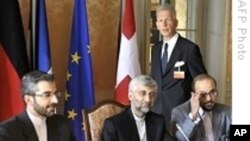Thursday's talks between Western powers and Iran on Tehran's nuclear ambitions have sparked a mixed reaction. Iran pledged to allow international inspectors into a previously secret nuclear facility. It also agreed in principle to ship some of its uranium abroad for reprocessing, although there is apparently still some confusion over that point. But the fact that there was any such meeting at all is considered significant.
For many months, the Iranian nuclear issue has simmered and at some points threatened to boil over. Finally, after months of delays, suspicion, and mutual recrimination, Iranian and Western diplomats sat down for talks in Geneva that included a rare one-on-one direct meeting between an Iranian and an American official.
Former Department of Energy intelligence chief Rolf Mowatt-Larssen says the fact that there was a meeting at all is cause for some cautious hope.
"I think it's, like everyone has stated, encouraging that at least the initial reaction wasn't deeply negative. So that implies to me that the engagement is still a possibility," he said. "I think it's also important not to get our hopes too high. I think for me, at least, is somewhat mild surprise that both sides' reactions have been guardedly constructive and positive. I think that in itself is significant, that there wasn't some sort of train wreck in Geneva," he added.
"This is a constructive beginning, but hard work lies ahead. We've entered a phase of intensive international negotiations," he said. "And talk is no substitute for action. Pledges of cooperation must be fulfilled. We have made it clear that we will do our part to engage the Iranian government on the basis of mutual interests and mutual respect, but our patience is not unlimited," said the president.
Reva Bhalla, an Iran affairs analyst with the private intelligence firm Stratfor, says the international community will now see if Iran follows through on its pledge to allow inspectors of the International Atomic Energy Agency, or IAEA, into previously secret nuclear facility near Qom.
"That's a compromise that's kind of a first step to see, to test the mettle of Iran in these negotiations," Bhalla said. "So it's kind of everybody's in a wait-and-see mode now to see if Iran follows through with these inspections and actually agrees then to the next step, which would be a more robust inspections regime where the IAEA can come in unannounced and explore all of Iran's nuclear facilities, which is Israel's core demand," said Bhalla.
Iran denies it has any aspirations to become a nuclear weapons power. But Mowatt-Larssen, who was also a career CIA officer specializing in weapons of mass destruction, says even a small facility like the one near Qom - which is not yet completed - raises suspicions.
"Any facility that could enrich uranium clandestinely - in other words, wouldn't be safeguarded or the international community would not be aware of - could be used as a location to further the enrichment from peaceful, low-enrichment levels to the levels that it would take to only for one purpose, which is to put into a nuclear weapon," he said.
Watching on the sidelines is Israel. Alarmed at the harsh rhetoric from hardline Iranian President Mahmoud Ahmadinejad, Israel has been trying to push the West to get tougher with Iran, even to the point of possible military action. Reva Bhalla says Israel is closely monitoring for any sign of a faltering diplomatic process.
"Iran is of course familiar with the usual delay tactics. They've studied the North Koreans and how they've manipulated these negotiations. And Israel is looking for that first stumble on the negotiating path to raise the pressure again on the United States," Bhalla said.
Western officials say Iran agreed in principle Thursday to ship out most of its enriched uranium for reprocessing in Russia and France. The fuel would then be returned to power a Tehran reactor used for medical purposes. The uranium would be of a purity sufficient for the reactor but not suitable for making a nuclear bomb. Such a move - described by Western officials as a confidence-building measure - would address at least some concerns about nuclear material being diverted to weapons use.
However, subsequent reports quote Iranian officials as denying that any agreement has been reached on how much will be exported for reprocessing into the higher grade uranium needed for the reactor.
The U.S. has previously demanded that Iran completely halt uranium enrichment before Washington would sit down for talks with Iran.




